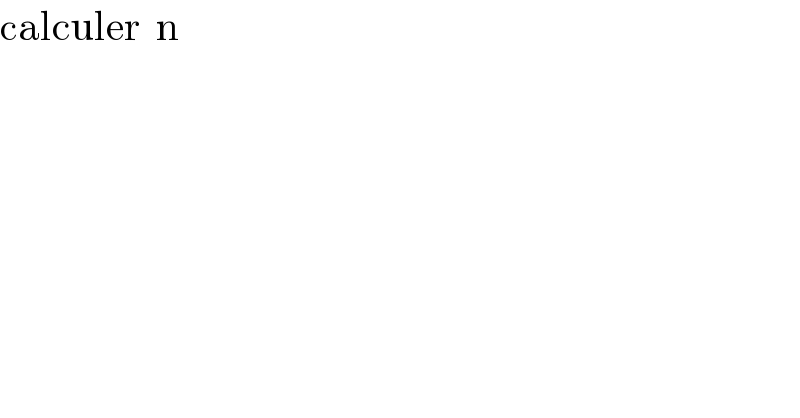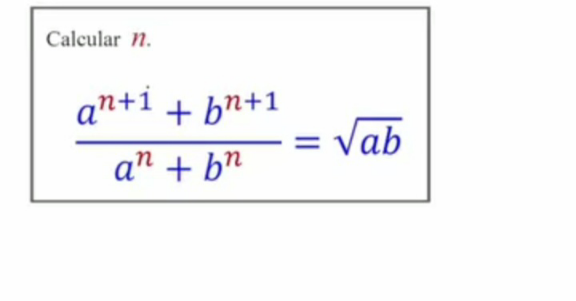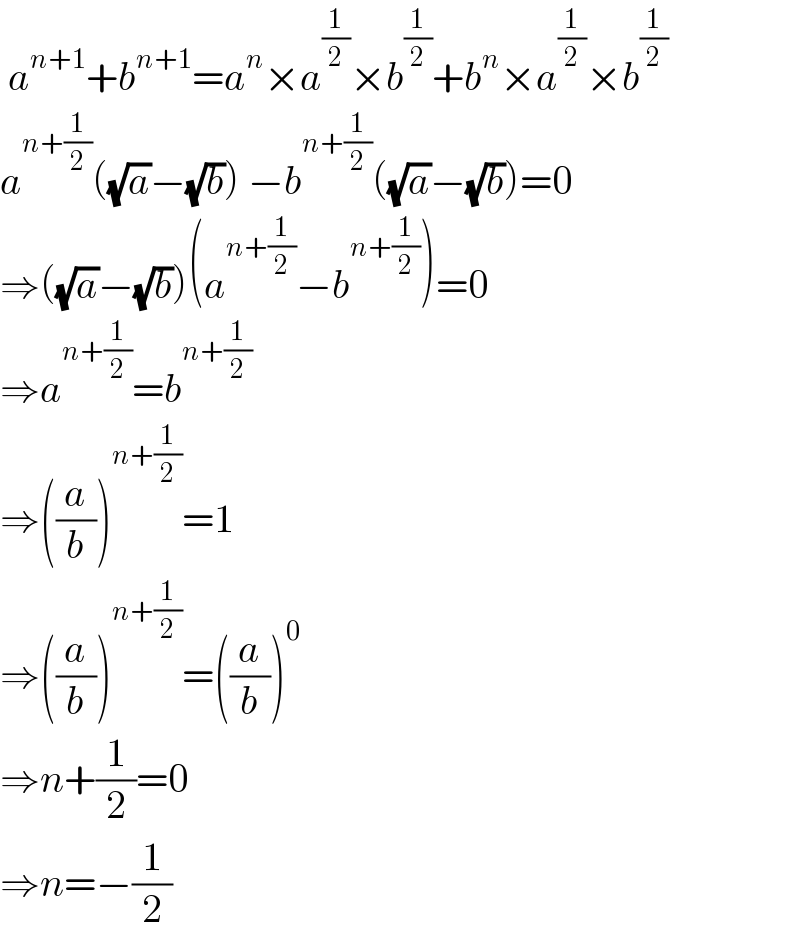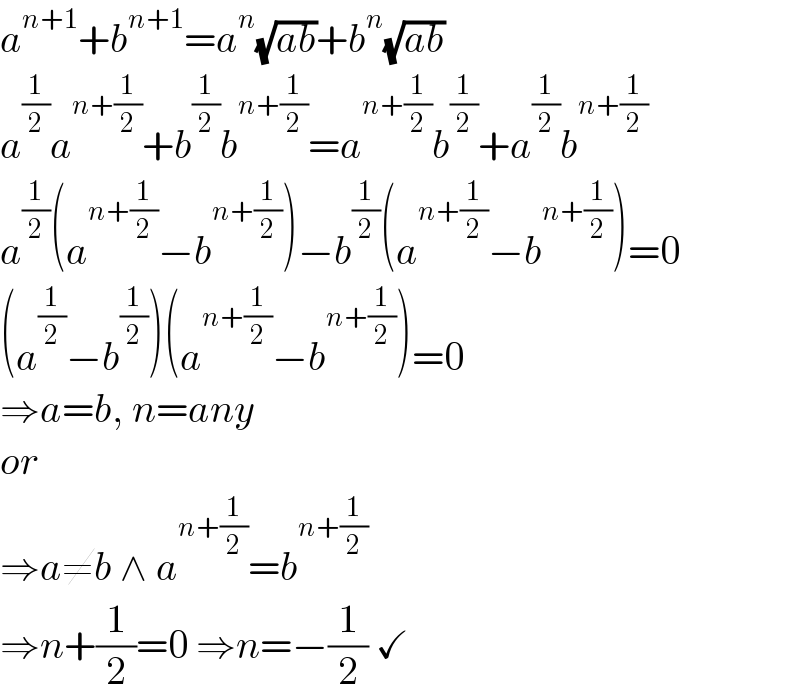
Question Number 214144 by a.lgnaoui last updated on 29/Nov/24

$$\mathrm{calculer}\:\:\mathrm{n}\:\:\:\: \\ $$
Commented by a.lgnaoui last updated on 29/Nov/24

Commented by deleted31 last updated on 29/Nov/24

$${n}..? \\ $$
Commented by som(math1967) last updated on 29/Nov/24

$$\:{n}=−\frac{\mathrm{1}}{\mathrm{2}}\:\:\:{if}\:\:\sqrt{{a}}\neq\sqrt{{b}} \\ $$
Commented by deleted31 last updated on 29/Nov/24

$$\mathrm{huh}...?\:\mathrm{why}...? \\ $$$$\mathrm{why}\:{n}=−\frac{\mathrm{1}}{\mathrm{2}} \\ $$
Commented by som(math1967) last updated on 29/Nov/24

$$\:{a}^{{n}+\mathrm{1}} +{b}^{{n}+\mathrm{1}} ={a}^{{n}} ×{a}^{\frac{\mathrm{1}}{\mathrm{2}}} ×{b}^{\frac{\mathrm{1}}{\mathrm{2}}} +{b}^{{n}} ×{a}^{\frac{\mathrm{1}}{\mathrm{2}}} ×{b}^{\frac{\mathrm{1}}{\mathrm{2}}} \\ $$$${a}^{{n}+\frac{\mathrm{1}}{\mathrm{2}}} \left(\sqrt{{a}}−\sqrt{{b}}\right)\:−{b}^{{n}+\frac{\mathrm{1}}{\mathrm{2}}} \left(\sqrt{{a}}−\sqrt{{b}}\right)=\mathrm{0} \\ $$$$\Rightarrow\left(\sqrt{{a}}−\sqrt{{b}}\right)\left({a}^{{n}+\frac{\mathrm{1}}{\mathrm{2}}} −{b}^{{n}+\frac{\mathrm{1}}{\mathrm{2}}} \right)=\mathrm{0} \\ $$$$\Rightarrow{a}^{{n}+\frac{\mathrm{1}}{\mathrm{2}}} ={b}^{{n}+\frac{\mathrm{1}}{\mathrm{2}}} \\ $$$$\Rightarrow\left(\frac{{a}}{{b}}\right)^{{n}+\frac{\mathrm{1}}{\mathrm{2}}} =\mathrm{1} \\ $$$$\Rightarrow\left(\frac{{a}}{{b}}\right)^{{n}+\frac{\mathrm{1}}{\mathrm{2}}} =\left(\frac{{a}}{{b}}\right)^{\mathrm{0}} \\ $$$$\Rightarrow{n}+\frac{\mathrm{1}}{\mathrm{2}}=\mathrm{0} \\ $$$$\Rightarrow{n}=−\frac{\mathrm{1}}{\mathrm{2}} \\ $$
Commented by deleted31 last updated on 29/Nov/24

$$.....?? \\ $$$$\mathrm{that}'\mathrm{s}\:\mathrm{a}\:\mathrm{leap}\:\mathrm{i}\:\mathrm{can}'\mathrm{t}\:\mathrm{accept} \\ $$$$\mathrm{a}^{\mathrm{n}+\mathrm{1}} +\mathrm{b}^{\mathrm{n}+\mathrm{1}} =\mathrm{a}^{\mathrm{n}} \sqrt{\mathrm{ab}}+\mathrm{b}^{\mathrm{n}} \sqrt{\mathrm{ab}} \\ $$
Commented by mr W last updated on 29/Nov/24

$${if}\:{n}\:{should}\:{be}\:{integer},\:{then}\:{you}\:{must} \\ $$$${set}\:{a}={b}.\:{otherwise}\:{there}\:{is}\:{no} \\ $$$${solution},\:{i}.{e}.\:{the}\:{question}\:{is}\:{wrong}. \\ $$
Commented by laphop last updated on 01/Dec/24
I really like it, I solved it for a^n+b^m.
Answered by mr W last updated on 29/Nov/24

$${a}^{{n}+\mathrm{1}} +{b}^{{n}+\mathrm{1}} ={a}^{{n}} \sqrt{{ab}}+{b}^{{n}} \sqrt{{ab}} \\ $$$${a}^{\frac{\mathrm{1}}{\mathrm{2}}} {a}^{{n}+\frac{\mathrm{1}}{\mathrm{2}}} +{b}^{\frac{\mathrm{1}}{\mathrm{2}}} {b}^{{n}+\frac{\mathrm{1}}{\mathrm{2}}} ={a}^{{n}+\frac{\mathrm{1}}{\mathrm{2}}} {b}^{\frac{\mathrm{1}}{\mathrm{2}}} +{a}^{\frac{\mathrm{1}}{\mathrm{2}}} {b}^{{n}+\frac{\mathrm{1}}{\mathrm{2}}} \\ $$$${a}^{\frac{\mathrm{1}}{\mathrm{2}}} \left({a}^{{n}+\frac{\mathrm{1}}{\mathrm{2}}} −{b}^{{n}+\frac{\mathrm{1}}{\mathrm{2}}} \right)−{b}^{\frac{\mathrm{1}}{\mathrm{2}}} \left({a}^{{n}+\frac{\mathrm{1}}{\mathrm{2}}} −{b}^{{n}+\frac{\mathrm{1}}{\mathrm{2}}} \right)=\mathrm{0} \\ $$$$\left({a}^{\frac{\mathrm{1}}{\mathrm{2}}} −{b}^{\frac{\mathrm{1}}{\mathrm{2}}} \right)\left({a}^{{n}+\frac{\mathrm{1}}{\mathrm{2}}} −{b}^{{n}+\frac{\mathrm{1}}{\mathrm{2}}} \right)=\mathrm{0} \\ $$$$\Rightarrow{a}={b},\:{n}={any} \\ $$$${or} \\ $$$$\Rightarrow{a}\neq{b}\:\wedge\:{a}^{{n}+\frac{\mathrm{1}}{\mathrm{2}}} ={b}^{{n}+\frac{\mathrm{1}}{\mathrm{2}}} \: \\ $$$$\Rightarrow{n}+\frac{\mathrm{1}}{\mathrm{2}}=\mathrm{0}\:\Rightarrow{n}=−\frac{\mathrm{1}}{\mathrm{2}}\:\checkmark \\ $$
Commented by a.lgnaoui last updated on 29/Nov/24

$$\mathrm{thanks} \\ $$
Commented by deleted31 last updated on 29/Nov/24

$$\mathrm{hmmm}.......\:\mathrm{good}\:\mathrm{solution}\:\mathrm{Bro} \\ $$
